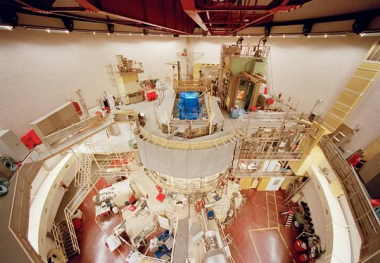A Polish research reactor called Maria is to supply US medical company Covidien with the medical isotope molybdenum-99 (Mo-99) in a deal announced just before the Dutch High Flux Reactor (HFR) reactor shut down for major repairs.
 |
HFR - due back online in August (Image: NRG) |
HFR was closed down as scheduled on 19 February for extensive repairs to concrete-encased aluminium pipes carrying cooling water. Deformations due to corrosion were discovered in August 2008 when bubbles of gas were detected in one of the plant's reducers, part of the primary cooling system. The plant, at Petten in the Netherlands, was shut down while the problem was investigated, but was re-started in February 2009 after Dutch nuclear safety regulators granted an extraordinary licence for owner-operator NRG to operate HFR until March 2010, in the light of ongoing global shortages in medical radioisotope supplies.
Before the pipes can be repaired the concrete encasing them must first be removed. The pipes will then be inspected and decisions made on whether local repairs or replacements are necessary. After the pipes have been repaired or replaced, a corrosion-resistant layer will be applied before they are re-encased in concrete. The work is expected to take months to complete, with a planned reactor restart date of August 2010. NRG has set up a section on its website dedicated to the repair project and plans to publish a monthly update on progress.
The Dutch reactor supplies some 60% of Europe's demand for Mo-99, used to generate the world's most widely used medical radioisotope, technetium-99m (Tc-99m). Tc-99m is a very short-lived isotope, decaying in a matter of hours, and is used in medical imaging applications. However, as Mo-99 has a half-life of only 66 hours, hospitals require a reliable, steady supply of the isotope. Recent years have seen world supplies of medical radioisotopes in turmoil when the reactors used to produce the isotopes have encountered problems. HFR and Canada's National Research Unit (NRU), which is also out of service for major repairs, would usually supply some 65% of the world's medical isotopes between them.
NRG says it is doing its best to limit the consequences of the reactor shutdown to a minimum, and is holding "intensive discussions" with government bodies, isotope producers and customers to safeguard as far as possible the availability of medical isotopes.
Covidien welcomes Maria
Days before HFR was shut down, Covidien announced an agreement with the Institute of Atomic Energy in Poland (IAE POLATOM) for POLATOM's Maria research reactor to supply it with Mo-99. According to Covidien, the new agreement should enable it to help meet the needs of more than one million additional patients in the first six months after the Polish reactor begins supplying the isotope.
Covidien reports that Mo-99 produced during a test irradiation at Maria is currently being processed at its facility at Petten in the Netherlands, and says that Tc-99m derived from the Mo-99 produced in Poland should be commercially available to help meet European needs within 30 days. The necessary approvals from the US Food and Drug Administration and Health Canada to allow it to be used in those countries is pending.
Covidien pharmaceuticals president Timothy R Wright described the new agreement as historic. "It is the first time in decades that a new reactor has been brought into the global supply chain for medical isotopes," he said.
Maria joins Belgium's BR2, France's Osiris reactor and South Africa's Safari reactor in Covidien's active supply chain now that HFR is out of service.
Researched and written
by World Nuclear News




_23621.jpg)

_63865.jpg)
_18570.jpg)





